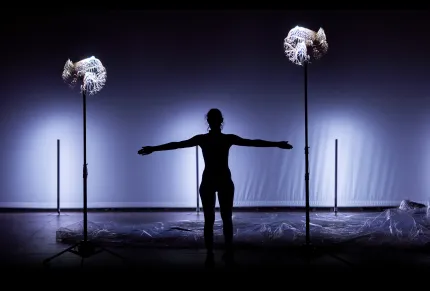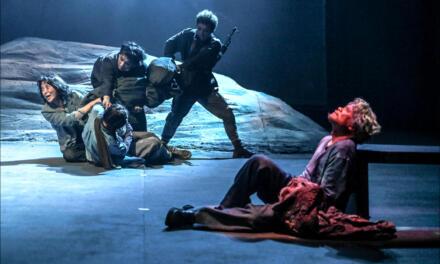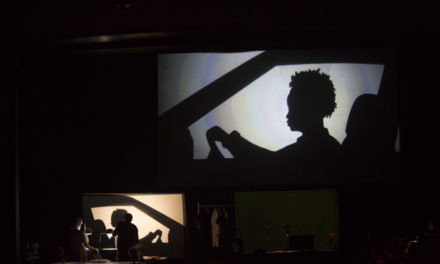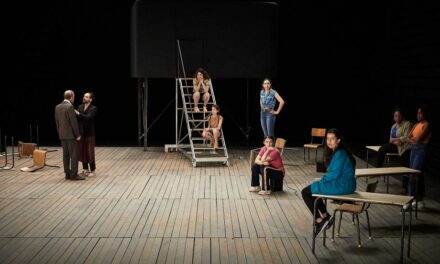Agrupación Señor Serrano go where other theatre-makers fear to tread. They are always one step ahead in recognising that form is content and it’s not about what you do but how you do it that performance’s potency lies. La isla / The Island, the company’s most recent work, is no exception – taking further some of the questions they raised about the implications of AI on artistic practice in last year’s Extinción / Extinction (2022). Here AI is not just a part of the work but rather a key component of the creative process. An lsland is a work made with AI as much as about AI, and it asks a series of complex and timely questions about agency, identity, and intersectionality.
An Island is effectively generated through AI – the content, the music, the movement, the plot (in as far as a plot exists) – only instead of presenting the recommendations provided by AI as simply the product, the company question and interrogate the information they are presented with. As the pieces of the jigsaw come together, the audience begins to realise that AI is shaping the action – but explanation often follows action, with the audience constantly playing catch up. The lone female performer who opens the production, clad in a white lycra bodysuit, undertakes a series of repetitive yoga exercise — but this warm up is the action, running across the 65 minute duration; the routine is exposed as being AI choreographed at a later stage in the production. Her moves, all variations on a routine, provide a parallel performance as well as a comment on the on-screen ruminations. The rumbling and irritating soundtrack that plays in the background may appear soothing for two minutes but it then evolves a more grating register – music another AI generated element of the production. There is a sense of a world turned in on itself — with the endless variations on a theme. References are repeatedly recycled as the extraordinary and the mundane lie cheek by jowl.
The interactive dialogue that Àlex Serrano and Pau Palacios have with an AI respondent is projected onto the back screen. Conversations held over the past year have been edited by Serrano and Palacios who share the show’s dramaturgical and directing responsibilities. Replies from the AI respondent are instant. There is no wish to stop and rethink, to pause and start again. Slow culture has been replaced with quick and easy answers – instant gratification. This is what AI offers. The answers may appear improbable, but they are sold with a line of confidence and repeated allegations of impartiality. As Serrano and Palacios scratch at the surface of what impartiality means, it is all too clear that the language models from AI that they are engaging with have a repository that is anything but impartial. Answers on the story Serrano and Palacios should construct are very much driven by Western classical tropes and mythical narratives, variations on Robinson Crusoe with the AI respondent unable to interrogate the ideological implications of what they are proposing.
There is always an answer from the AI respondent; silence is never an option. Answers proliferate – slick, smart, engaging but ultimately unconnected. For it is this element of connectivity, of communication as something that might not need an immediate answer that the piece exposes. The story of the castaway that moves from island to island proposed by the AI respondent might present itself on the surface as a modern-day Odyssey but here Odysseus is largely absent. At one point Serrano and Palacios tellingly reflect on whether The Odyssey could be generated by AI. Based on An Island, my answer would be a resolute no. The assailants, antagonists and tests here feel far more mundane – and there is no sense of any lessons learned from the encounters. Perhaps, in our digital existence, we are destined to wander without destination – endless island hoping with inhabitants that we would not choose to live with. Hell, Sartre reminds us in Huis Clos, is other people, and the others constructed in An Island are cliched and remote: a party of rugby fans that invade the stage; the yellow owls; the four dancers holed in an inflatable transparent bubble-like tent that replay a series of disco moves interminably, even as their environment collapses around them; the holograms that dazzle and dance across the stage like modern day windmills – impossible to catch and then disappearing into the darkness. And through it all the performer in white continues with her yoga exercises, stretching and dancing, with a series of repetitive, never ending moves.
Núria Guiu’s choreography, realised with the performers, is precise and pulsating. Nico Roig’s music, again emerging from AI, underscores the entire piece, a rumbling that incorporates the obvious, the literal and the unexpected. Xesca Salvà’s design deploys the empty stage motif only to turn it on its head with the select props needed to create illusions that dance across the proscenium frame.
There are a series of reflections on the other through the production – both in the questions Serrano and Palacios ask the AI respondent and in the variations on the moves provided by the physical performers and in the hologram videos. How we define ourselves, what identity means and what consciousness is possible in AI are effectively probed in the curt conversations on screen. It is never quite clear who “the other” is that is consistently referred to. Indeed, the production seems to suggest that each and every one of us are “an other” to those we engage with. And it is in the power of listening – of bodies attuned to each other so that they don’t quite collide, of humans engaging in nuanced ways — that our humanity lies. AI doesn’t quite yet allow this, at least yet. The responses the AI respondent generates may be clever, but they never feel subtle.
Perhaps this is the whole point of the production – the surface is dazzling, precise, and choreographed but ultimately vacuous. The production is beautiful in its floating imagery and its defiant poetry. At times, I felt as if I was in a gallery but kept distant from the action, almost behind a transparent screen. The frame of the stage contains and constricts the images but I wanted to walk through and around them, to engage in a more direct way with both the animate and the inanimate. I wanted to feel the live element and participate in it more fully than the parameters would allow. Perhaps, as with the castaway moving mindlessly from island to island, the production suggests we are all castaways in an AI world, all destined to wander endlessly through a universe over which we have ever less control. Touch remains always out of reach.
The production makes no concessions to cause and effect storytelling and Serrano and Palacios continuously thwart the quest narratives that AI generates through their onscreen textual engagement – words floating and always disembodied. Five audience members left before the end at the Madrid opening night at the Conde Duque Cultural Centre — who knows why but Agrupación Señor Serrano’s theatre has never been about plots and catharsis, quick fixes, easy laughs or instant gratification. Theirs is a theatre that invites the audience on a journey where they work through the performance. This is not theatre for the faint-hearted. What An Island gives its audience is a theatrical essay, with the different scenic components in a conversation that never feels easy or straightforward.
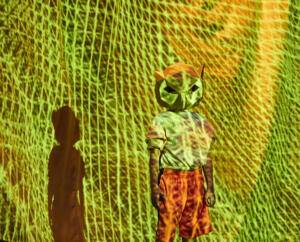
Una isla. ®Leafhopper
For all the seriousness of the subject matter, however, An Island retains a playful edge. Serrano and Palacios may disdain the AI respondent recommending they open their play with a curtain, but curtains and screens proliferate in the piece: the site of projections transporting the audience to mythical islands referencing canonical works from Western mythology; rising and falling to point to a change of scene; closing action down before the action moves in a very different direction. An Island reminds its audiences that theatre is always about tropes recycled in different configurations. It encourages us as spectators to not believe everything we hear and perhaps, for all the protestations about the limitations of AI, it shows that AI’s influence is more pervasive and insidious than we may think.
Una isla / An island plays at the Conde Duque Cultural Centre Madrid until 29 October.
This post was written by the author in their personal capacity.The opinions expressed in this article are the author’s own and do not reflect the view of The Theatre Times, their staff or collaborators.
This post was written by Maria Delgado.
The views expressed here belong to the author and do not necessarily reflect our views and opinions.

